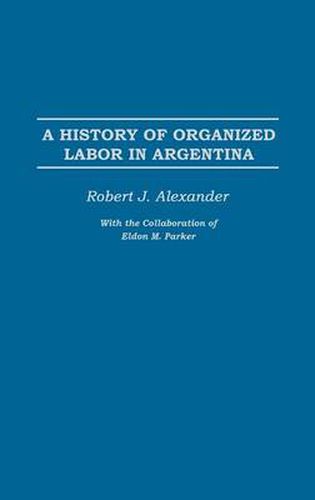Readings Newsletter
Become a Readings Member to make your shopping experience even easier.
Sign in or sign up for free!
You’re not far away from qualifying for FREE standard shipping within Australia
You’ve qualified for FREE standard shipping within Australia
The cart is loading…






In this the third of a series of studies of the history of organized labor in Latin America and the Caribean, Alexander explores the history of the Argentine labor movement from the mid-19th century onward.
Throughout most of the 20th century, Argentina had one of the largest, strongest, and most militant organized labor movements in the Western Hemisphere. While the roots of the labor movement can be traced to colonial times and the craft guilds of that era, European immigrants, particularly from Italy and Spain, who were political refugees from the unrest of the mid-19th century were key to the development of the Argentine labor movement. During much of the late 19th century, the labor movement was predominantly under anarchist influence, although during and after World War I, syndicalists, Socialists, and Communists emerged as the predominant political influences in the trade union movement. The military coup d'etat of 1943 drastically altered the nature and size of Argentina’s organized labor as Juan Peron sought to utilize labor as a principal support-along with the armed forces-for the regime. During the nearly 18 years following the overthrow of Peron in 1955, the organized workers remained loyal to the fallen dictator. Peron returned to power in 1973 with the overwhelming support of the Argentine working class. After his death, the Peronista regime was again overthrown early in 1976 and a brutal seven-year military dictatorship sought to undermine organized labor. By and large successive governments have followed a similar strategy. The privatization of much of the state-owned sector of the economy and opening up Argentina’s economy to foreign competition have greatly weakened the country’s labor movement.
Utilizing his personal contacts as well as extensive written materials, Alexander has produced a study that will be of great use to scholars, students, and researchers involved with the history and current state of labor in Argentina and the Latin American world in general.
$9.00 standard shipping within Australia
FREE standard shipping within Australia for orders over $100.00
Express & International shipping calculated at checkout
In this the third of a series of studies of the history of organized labor in Latin America and the Caribean, Alexander explores the history of the Argentine labor movement from the mid-19th century onward.
Throughout most of the 20th century, Argentina had one of the largest, strongest, and most militant organized labor movements in the Western Hemisphere. While the roots of the labor movement can be traced to colonial times and the craft guilds of that era, European immigrants, particularly from Italy and Spain, who were political refugees from the unrest of the mid-19th century were key to the development of the Argentine labor movement. During much of the late 19th century, the labor movement was predominantly under anarchist influence, although during and after World War I, syndicalists, Socialists, and Communists emerged as the predominant political influences in the trade union movement. The military coup d'etat of 1943 drastically altered the nature and size of Argentina’s organized labor as Juan Peron sought to utilize labor as a principal support-along with the armed forces-for the regime. During the nearly 18 years following the overthrow of Peron in 1955, the organized workers remained loyal to the fallen dictator. Peron returned to power in 1973 with the overwhelming support of the Argentine working class. After his death, the Peronista regime was again overthrown early in 1976 and a brutal seven-year military dictatorship sought to undermine organized labor. By and large successive governments have followed a similar strategy. The privatization of much of the state-owned sector of the economy and opening up Argentina’s economy to foreign competition have greatly weakened the country’s labor movement.
Utilizing his personal contacts as well as extensive written materials, Alexander has produced a study that will be of great use to scholars, students, and researchers involved with the history and current state of labor in Argentina and the Latin American world in general.